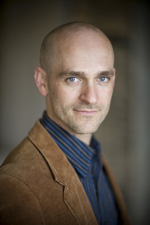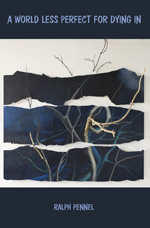|
Interview with Ralph Pennel
by Olivia Bush


The "world" referred to in the title of A World Less Perfect for Dying In has been described as an
"imperfect but beautiful place where we live and die" by Minnesota Poet Laureate Joyce Sutphen, and
as "a world haunted by beauty and despair" by Jim Moore, author of Invisible Strings. Both of those
descriptions suggest that the world is a two sided place, one that is beautiful, but also asphyxiating
and scary. Is this an accurate description in your opinion? If so, what particular poem in the work in
your opinion best encompasses such a description?
That is a good question. And, the answer is yes and no. I think looking at the world, or anything
as a simple binary system is fairly limiting. To see the world as, or to position oneself behind a
worldview that is strictly binary in nature and outcome is also particularly dangerous. I think Moore's assertion,
that the world revealed in the poems in this collection is "haunted by beauty" as an aspect of "despair," or
aspiration to spirit, which may feel counterintuitive, lends itself to a more comprehensive picture of my own
worldview. Because I often am haunted by what I love, to the point of "despair." I think all the poems have a way
of getting at these concerns, but if I had to pick I would say perhaps "Confiding in the Prison Guard," "Shooster,"
and even "Just off the Hennepin Bridge" are good representatives of these concerns.
I read a few of your short stories online ("Embracing Vast and Improbable" on germmagazine.com, and
"Something Like Forgiveness" on your blog), both of which seem to accurately reflect the notion that the world
has both beautiful and negative aspects. Are any of the topics/issues/inspirations in A World Less Perfect for Dying
echoed from previous works? Did any of your previous works serve as a base or framework for A World Less Perfect for Dying?
I would take that even further and say that beauty is relevation of self from the negative, that neither is an
experientially individuated aspect from the other.
Yes, absolutely. I would definitely say that the themes and tenants of A World Less Perfect for Dying In are present in
pervious works, even the works you mentioned (though it might be more accurate to say they all evolved simultaneously
and not sequentially). I think writers are constantly revisiting the same themes, always writing the same story,
the same poem, regardless of whether they are willing to admit it or not. It's definitely one of the reasons why I
write in more than one genre and even take liberties with traditional genre defining constraints. There are just
ideas that need expression that poetry may not be able to provide but other forms can. Or I may need to work through
an idea in multiple forms before I feel like I've wrapped my heart around it fully.
The second piece you mentioned is actually nonfiction. Which is a whole other beast. I don't often work in
nonfiction, but because I might still be too close to the subject to write about it effectively in poetry or fiction
I will turn to nonfiction as the form of conveyance. If I consciously take the subject on as nonfiction, I can seat
myself at the necessary distance from the subject at the onset to gain the correct emotional distance and perspective.
What is your favorite topic/idea to write about and why?
That is a tough one. I think maybe there are two things that rise to the top. One is the relationship between
memory and identity, which is a theme I'm working through in the new manuscript I've begun. I really became
engrossed in this idea when I began actively to try to reconcile my grandmother's death from Alzheimer's in combination
with ways I was thinking about self and consciousness. Religion/spirituality finds it way to the top, too
(and in many ways isn't necessarily a separate concern than the aforementioned). Most of the time I'm not
consciously aware of it. But, it has certainly played a part in the way I confront the task of how a poem
ought to elevate from the page.
Do you prefer writing poetry or prose? Why? Do you think there certain themes/issues to write about that are
better suited for either form? Which form do you think is more effective in conveying a message in general?
I like them equally, to be perfectly honest. Prose allows me to do things that poetry does not, take ideas,
images further. I don't know that there are necessarily themes exclusive to poetry or prose. Sometimes the
solution to a concern I have expresses itself to me initially in a way that's too big for poetry so I pursue
it in prose. Or maybe I'm too close to something emotionally to pursue it through poetry yet, so I'll take it
on through prose. Or, sometimes, I just want to write a story.
How has your writing evolved throughout your career?
I take fewer and more risks, both. I take different risks than I used to, but I think I'm taking better risks.
I think I care more about the risks I take. It's a slower process, but a necessary one. For instance, I used to
write more "love" poems, but that was because love was a risk when I was younger. And, of course, they weren't
really about loving an "other" but were about accepting a "self." I'm more centered so I am less indebted to
defining the inaccessible, the ineffable in this way through this lens.
What is your favorite work that you have written? That someone else has written?
Honestly, concerning individual pieces, I don't know if I can answer this. But, I will say that my favorite
projects have been the assembling of A World Less Perfect for Dying In and the novel that I need to go back
and revise. The novel actually keeps tugging at me, so I may need to dust it off and devote some new energy
to it. They are two very different processes, though I did find that the way the characters revealed themselves
to me while working on the novel was a bit like the way that a poem reveals itself to me when I'm really working
in an unconscious space. I liked quite a bit that, that was true. It definitely made writing long form fiction
feel more like home.
Where do you find/how do you cultivate ideas and inspiration?
What drives you to be a writer?
Anything can push or inspire me to write. But I pay close attention to the things I can't let go of,
the things I "obsess" over, the things that burn a little longer after ingestion. This is not uncommon for writers
in general, though some may work from a less conscious forward process and may only acknowledge the connections after
moving on from particular projects. Which isn't wrong. Ideas, incidents that pertain to identity, aspects of the
self carry particular resonance with me.
I've been connected to the arts in some capacity in my life since I can remember. I drew every day as a child, have
always sought creative outlets, been drawn to creative communities. Writing is one way to engage in the creative
process that I find particularly satisfying, as is photography, which I take nearly as much pleasure in. I also
really enjoy puzzles, so arranging language to generate ways of experiencing meaning is particularly interesting
to me.
Order A World Less Perfect for Dying In here...

|

